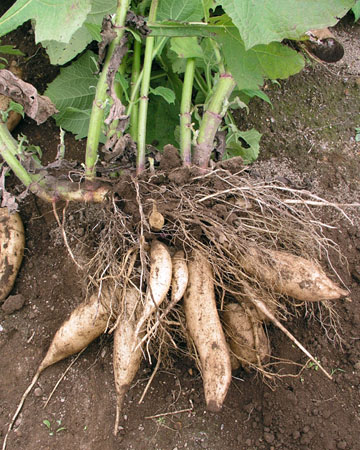Yacon helps you lose weight, but what is yacon?
The botanical names of yacon are Smallanthous sonchifolious, Polymnia edulis, Polymnia sonchifolia.
Originally from South America and primarily grows in the Andes of Peru, Colombia, and Argentina. It was transplanted in small scale to different countries like New Zealand, Australia, Japan, China, South Corea, Philippines, United States, and the UK.
The plant can grow up to 2mt/6.5 ft. It is a perennial plant. Its tuberous roots are edible and taste like an apple/celery/watermelon flavor. This is why it is called Peruvian Ground Apple or Apple From The Earth
It is relative to the sunflower and the Jerusalem artichoke.
It is edible for human consumption especially the tubers. The yacon roots and plant have the potential to be used for animal feed too.
Nutrients in Yacon
Yacon is low in calories and refreshing. It is used as a sweetener.
Yacon Protein Sugar/Inulin Fat Fiber Ash
Fresh tubers 0.4-2.2% 20%
Dry tubers 6-7% 60% 0.4-1.3 6-7% 4-7%
Dry herbage 11-17% 38-41% 2-7%
Yacon tubers store carbohydrates in the form of Inulin instead of starch, similar to beets.
Inulin is a soluble fiber, a polymer of fructose with a glucose terminal unit.
To hydrolize Inulin, the intestine needs a specific enzyme, but humans do not have this enzyme, therefore inulin cannot be digested, absorbed and metabolized. This is a fiber.
Inulin is considered a prebiotic. Prebiotics are nutrients that promote intestinal health and aid digestion by feeding the good bacteria of the intestine.
Yacon contains Inulin made of the following sugars: Fructooligossacharide (FOS) and indigestible polysaccharides made of fructose. This is why the tubers taste sweet but are not digested or metabolized and have little caloric value.
Other roots like potato, yam, sweet potato and yucca store carbohydrates as starch, a polymer of glucose.
Yacon tubers are rich in Potassium, Calcium, and Phosphorus.The yacon roots and leaves have antioxidants:
1-Protocatechuis Acid (PCA) metabolite of polyphenol found in Green tea. PCA is antioxidant and anti-inflammatory.
2- Chlorogenic Acid is contained in peaches, potatoes, and eggplants too, and it is known to lower slightly high blood pressure; it can cause allergic respiratory reaction in susceptible people.
3- Cafeic Acid is found in mushrooms, coffee, argan oil, thyme, sage, spearmint, cinnamon, star anise, sunflower seeds, red wine, apple sauce, apricot, prunes, yerba mate, black chokeberry, lingonberry, barley and rye. Cafeic Acid inhibits cancer cell proliferation, reduces aflatoxin production, it is a natural fungicide. Cafeic Acid is antioxidant, antiinflamatory. Improves intestinal health.
4- Tryptophan: Tryptophan is an amino acid and a building block protein. It was thought that it was an antioxidant but now there are studies that show that it is not the Tryptophan by itself but its metabolites that are the antioxidants.

5- Ferulic Acid: Found in plants, popcorn , bamboo, wheat, flax seed, barley, yacon, blue and common beans, Chinese medicinal herbs – Angelica sinensis/ female ginseng, Cimicifuga heracleifolia/Cohosh, Ligusticun chuangxion/licorice root-, Ceuntarium erithraea/ European centaury tea plant, rice bran Chinese oil. It is released and absorbed in the small intestine. Ferulic acid is antioxidant and helps in the prevention of cancer and aging by reducing free-radicals and reactive oxygen species (ROS) that are related to DNA damage, cancer and aging. Topical preparations of vitamin E, ascorbic acid and ferulic acid help to prevent wrinkles and cancer of the skin.